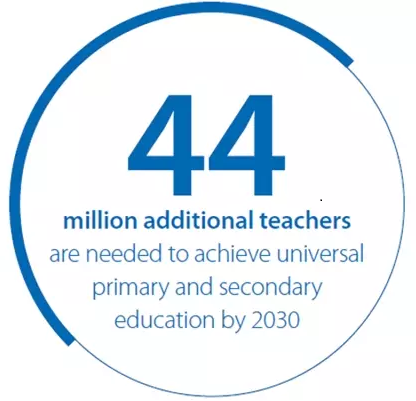
Upskill Anytime, Anywhere: Why Micro-Credentials Are Transforming Teacher Growth
15th September 2025
In today’s fast-changing world, teachers are expected to adapt as quickly as the technology and trends shaping classrooms. The era of lifelong learning and micro-credentials has arrived, allowing educators to continuously refine their skills without the constraints of traditional models. Micro-credentials allow teachers to sharpen skills in digital literacy, classroom management, and inclusive education, helping them stay adaptable and impactful in today’s evolving classrooms.
For those seeking structured pathways, specialized Degree Courses provide a strong foundation to integrate micro-credentials into broader career development. These flexible options enable teachers to upskill anytime, anywhere, while preparing them for global opportunities in education.
In this blog, we’ll explore why lifelong learning is essential, how micro-credentials are shaping teaching careers, and why they’re becoming the new norm for educators worldwide.
Why Lifelong Learning Is Essential?
Lifelong learning is an ongoing, self-driven journey of acquiring knowledge, fueled by both personal growth and professional aspirations. For teachers, it’s no longer optional, it’s a necessity. As technology advances and teaching methods evolve, educators must keep pace to remain effective.
This ongoing process allows teachers to:
- Improve instructional methods.
- Integrate new technologies into their classrooms.
- Adapt to diverse student needs with confidence.
Reports from organizations like UNESCO highlight the urgent demand for structured professional development, showing that educators who embrace lifelong learning are better positioned for career growth and improved student outcomes.
What Are Micro-Credentials?
Micro-credentials are digital certifications that validate expertise in a specific area. Unlike traditional qualifications, they are shorter, flexible, and focused on niche skills, ideal for teachers looking to upskill quickly in topics like inclusive education or digital pedagogy.
Benefits for Teachers
- Flexibility and Accessibility: Most are available online, allowing teachers to learn at their own pace.
- Recognition and Specialization: Micro-credentials boost employability by showcasing targeted expertise.
- Responsive Learning: Teachers can rapidly adapt to educational innovations, from AI integration to online classroom strategies.
Examples of In-Demand Micro-Credentials
- Digital Literacy: Integrating apps, platforms, and tools effectively in lessons.
- Classroom Management: Techniques for creating positive, inclusive learning environments.
- Inclusive Education: Skills to support students with diverse learning needs.
By earning micro-credentials, educators not only add value to their résumés but also improve student outcomes through updated, relevant teaching practices.
Global Trends in Teacher Upskilling
Let’s get to know about the recent global trends and how it become the necessity for teachers to upskill themselves with micro-credentials:
1. UNESCO and Global Education Needs

UNESCO projects that 44 million new teachers will be needed by 2030. This highlights the importance of professional development models like micro-credentialing, which can fill the gap by equipping educators with adaptable, practical skills.
2. Teacher Growth in OECD(Organisation for Economic Co-operation and Development) Countries
Research shows that nearly 70% of teachers in OECD countries engage in professional development annually. This reflects a global commitment to ongoing teacher training as the backbone of quality education.
3. Lessons from COVID-19
The pandemic fast-tracked the use of digital teaching, highlighting the importance of flexible and adaptable learning models. Teachers worldwide turned to online micro-credentials to strengthen digital competencies and adapt to virtual classrooms, trends that are here to stay.
Read More: Upskilling Educators with Micro-Credentials: 2025 Trends You Need to Know
Micro-Credentialing Globally
Micro-credentialing has quickly moved from trend to mainstream, with platforms like Coursera, edX, and institutions such as ACT leading the way. Growing partnerships between universities and education providers now ensure that these certifications are formally recognized.
For teachers, this global acceptance is transformative. Their achievements are validated not only in their home countries but also on an international scale, opening doors to career mobility, cross-border opportunities, and recognition as globally competent educators.
This shift signifies that professional development is no longer about one-time qualifications, it’s about continuous growth. Teachers who embrace micro-credentials demonstrate adaptability, innovation, and a commitment to lifelong learning, qualities increasingly valued worldwide.
Bottom Line
Micro-credentials and lifelong learning are no longer optional, they’re the new standard for teacher development. They empower educators to refine their methods, adopt new technologies, and meet the diverse needs of today’s students with confidence.
Structured pathways such as Online Teaching Degrees and Education Programs and flexible Degree Courses further enhance this journey, ensuring that teachers combine recognized qualifications with practical, up-to-date skills.
As the global demand for effective educators grows, those who embrace micro-credentialing and continuous learning will not only future-proof their careers but also play a vital role in shaping inclusive, dynamic, and tech-ready classrooms.
Frequently Asked Questions (FAQs)
1. What are micro-credentials in education?
Micro-credentials are short, targeted certifications that validate a teacher’s expertise in specific skills such as digital literacy, classroom management, or inclusive education. They are flexible, often online, and quicker to complete than traditional qualifications.
2. Why is lifelong learning important for teachers?
Lifelong learning helps teachers stay relevant in an evolving educational landscape. It allows them to update their methods, integrate new technologies, and meet the diverse needs of modern classrooms effectively.
3. How do micro-credentials benefit teachers’ careers?\
They enhance employability by showcasing specialized skills, support career mobility, and prepare teachers for leadership roles. Micro-credentials also demonstrate adaptability—a highly valued trait in education today.
4. Are micro-credentials recognized globally?
Yes. With the rise of platforms like Coursera, edX, and FutureLearn, micro-credentials are increasingly accepted worldwide. Many universities and institutions now partner with these platforms to formally recognize teachers’ achievements.
5. How do Online Teaching Degrees and Education Programs support lifelong learning?
Flexible Degree Courses provide a structured pathway for teachers. They combine comprehensive qualifications with the agility of micro-credentials, helping educators adapt and thrive in global classrooms.
Written By : Park Jin Ae




